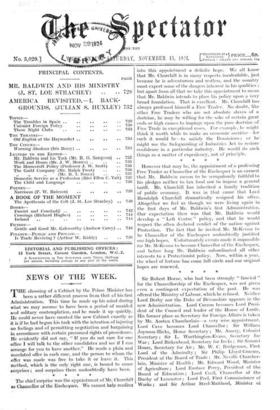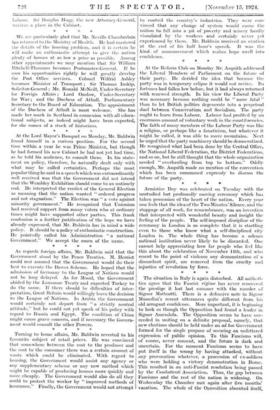Sir Robert Horne, who had been strongly " fancied "
for the Chancellorship of the Exchequer, was not given even a contingent expectation of the post. He was offered the Ministry of Labour, which he refused. Neither Lord Derby nor the Duke of Devonshire appears in the new Administration. Lord Curzon becomes Lord Presi- dent of the Council and leader of the House of Lords. His former place as Secretary for Foreign Affairs is taken by Mr. Austen Chamberlain—a very wise appointment. Lord Cave becomes Lord Chancellor ; Sir William Joynsou-Hicks, Home Secretary ; Mr. Amery, Colonial Secretary ; Sir L. Worthington-Evans, Secretary for War ; Lord Birkenhead, Secretary for India ; Sir Samuel Hoare, Secretary for Air ; Mr. W. C. Bridgeman, First Lord of the Admiralty ; Sir Philip Lloyd-Graeme, President of the Board of Trade ; Mr. Neville Chamber- lain, Minister of Health ; Mr. Edward Wood, Minister of Agriculture ; Lord Eustacc Percy, President of the Board of Education ; Lord Cecil, Chancellor of the Duchy of Lancaster ; Lord Peel, First Commissioner of Works ; and Sir Arthur Steel-Maitland, Minister of Labour. Sir Douglas Hogg, the new Attorney-General, Tee ives a place in the Cabinet.
* * *











































 Previous page
Previous page